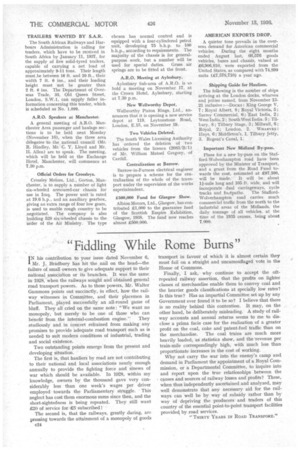"Fiddling While Rome Burns"
Page 78

If you've noticed an error in this article please click here to report it so we can fix it.
IN his contribution to your issue dated November 6, Mr. J. Bradbury has hit the nail on the head—the failure of small owners to give adequate support to their national association or its branches. It was the same in 1928, when the railways sought and 'obtained general road transport powers. As to those powers, Mr. Walter Gammons points out succinctly, in effect, how the railway witnesses in Committee, and their placemen in Parliament, played successfully an all-round game of bluff. They all cried on the same note: "We want no monopoly, but merely to be one of those who can benefit from the internal-combustion engine." They studiously and in concert refrained from making any promises to provide 'adequate road transport such as is needed to suit modern conditions of industrial, trading and social existence.
Two outstanding points emerge from the present and developing situation.
The first is, that hauliers by road are not contributing to their national and local associations nearly enough annually to provide the fighting force and sinews of war which should be available. In 1928, within my knowledge, owners by the thousand gave very considerably less than one week's wages per driver employed towards the Parliamentary struggle. This neglect has cost them enormous sums since then, and the short-sightedness is being repeated. They still want 220 of service for '25 subscribed
The second is, that the railways, greatly daring, are pressing towards the attainment of a monopoly of goods c24
transport in favour of which it is almost certain they must fail on a straight and uncamouflaged vote in the House of Commons.
Finally, I ask, why continue to accept the oftrepeated railway assertion, that the profits on lighter classes of merchandise enable them to convey coal and the heavier goods classifications at specially low rates? Is this true? Has an impartial Committee set up by any Government ever found it to be so? I believe that there is no reality behind this contention. It may, on the other hand, be deliberately misleading. A study of railway accounts and annual returns seems to me to disclose a prima facie case for the realization of a greater profit on the coal, coke and patent-fuel traffic than on the merchandise. The coal trains are much more heavily loaded, as statistics show, and the 'revenue per train-mile correspondingly high, with much less than proportionate increases in the cost of working.
Why not carry the war into the enemy's camp and demand in Parliament the appointment of a Royal Commission, or a Departmental Committee, to inquire into and report upon the true relationships between the causes and sources of railway losses and profits? These, when thus independently ascertained and analyzed, may well demonstrate that any necessary aid for the railways can well be by way of subsidy rather than by way of depriving the producers and traders of this country of the essential point-to-point transport facilities provided by road services.
"THIRTY 'YEARS IN ROAD TRANSPORT."








































































































































































